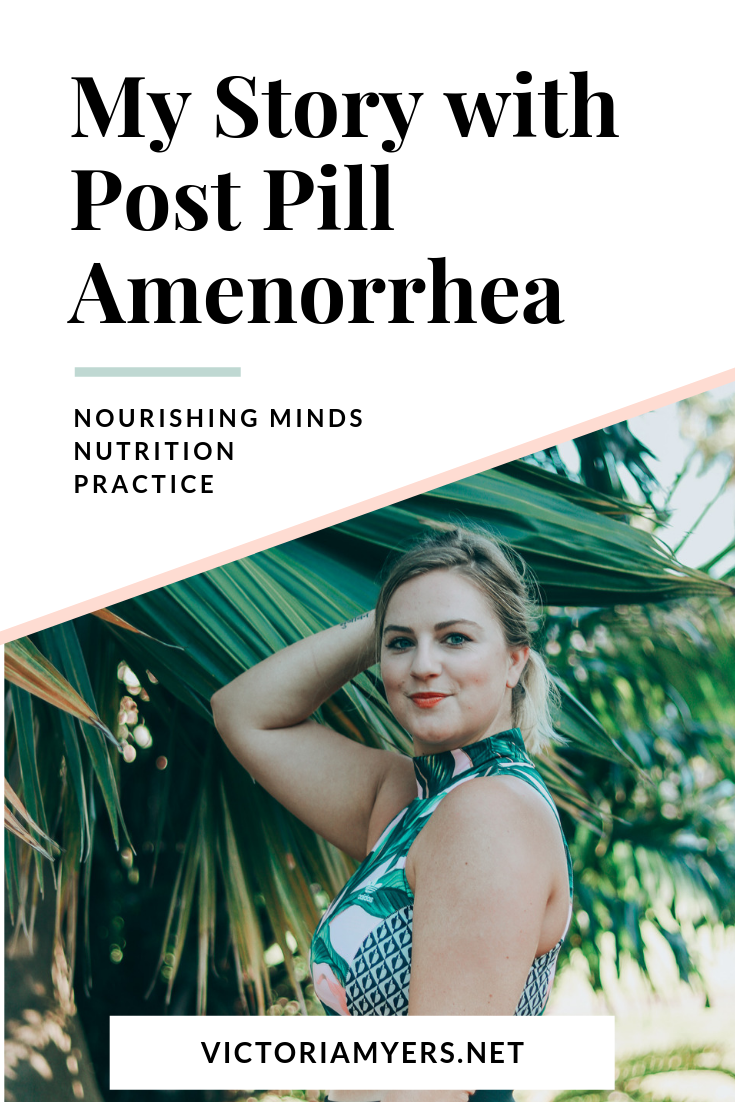My Story About Post-Pill Amenorrhea
What is Post-Pill Amenorrhea?
This post was originally written in February 2017 and has been updated and revised since.
Let's begin with a quick definition of what post-pill amenorrhea is. Amenorrhea is the absence of a period. There is primary amenorrhea, which means you have never had a period, and second amenorrhea where you once had a period and now it is absent.
Many people are familiar with hypothalamic amenorrhea (HA), but not as much with post-pill amenorrhea (or rather not made aware this can occur when getting off of birth control). Hypothalamic amenorrhea occurs when your hypothalamus shuts down and stops sending the hormones that provide the signals to tell your body it is safe enough to reproduce and create a menstrual cycle. This can occur because of a deficit energy balance or food intake, weight loss, exercise, and stress factors such as not enough sleep and poor stress management. For most cases, regardless of body size, this occurs when we are underfed and overexercised.
Post-pill amenorrhea, is the temporary or extended amenorrhea that can occur when a woman stops taking birth control methods such as oral contraceptives. For some women, this is temporary and they regain their periods within 3-6 months. For other women, the amenorrhea continues- which is likely due to the fact the body was already in a state that would have not produced a menstrual cycle. Because the pill makes women bleed from the synthetic hormones they take as birth control, it makes it hard for women to know what is really going on in their bodies (as this is an artificial bleed and not a real period).
While post-pill amenorrhea is not a formal medical diagnosis, I’ve seen enough cases of it in my practice (and experienced it personally!) to believe it should be one. When I see a case of post-pill amenorrhea or post birth control syndrome (symptoms that come back with a vengeance once no longer on the pill), I know from a health care provider standpoint this means they likely had these issues before or during taking the pill, and its my job to investigate and to determine what the factors causing the symptoms (or lack of period). At the bottom of this article, I’ll share my thoughts on what all women should do to support themselves when they do come off birth control.
My Story with Post-Pill Amennorhea
Alright, to the story!
In November of 2015, I made the decision to get off birth control. For me, this was not to get pregnant but because it no longer aligned with my beliefs about what we should put in our bodies. I know this is not possible for every woman to do (or a desire for every woman, and that’s okay!), but I personally felt comfortable making this decision despite the fact that at the time I wasn’t ready to start a family yet.
I truly believe medications have their purpose, but should be the last line of therapy, not the first as we typically see in Western medicine. I originally started taking birth control 12 years prior, when I was fifteen and experiencing terrible periods. My periods were so heavy I would have to bring multiple changes of clothing with me and the cramping was debilitating. So I got on birth control (which controlled the heavy periods) and never once got off of it for twelve years straight. Birth control for actual birth control methods is a lot different than taking birth control to mask period symptoms (which 60% of us take it for!).
So four years ago, I made the decision that I couldn't keep doing something that I knew was affecting my body. I believe a healthy hormonal cycle is vital for women and a wonderful sign that your body is functioning optimally. Since I had been on birth control since I was 15, I didn't know anything about my body or my own cycle. I couldn't even tell you what a sign of ovulation was because I had never experienced it! While I was not looking to start a family at the time, I knew that was something Nick and I eventually wanted and had a suspicion that it would take quite awhile to regulate my body from being on birth control for such a long time.
So I stopped taking it.
For eight months straight, nothing happened. Literally, nothing. No period, no signs/symptoms of my body in reproductive mode…nothing. It was like my body had no idea what to do when it was no longer taking external sources of hormones.
Thankfully, eight months later I got my first period. Hooray!
About a month or so after getting my first cycle without birth control (and after 8 months of nothing) I decided to implement the below strategies to encourage my cycle coming back. Four months later, I got my second cycle without birth control.
And from that point on it slowly became more and more regular. An 8 month cycle became a 4 month cycle became a 2 month cycle became a 38 day cycle became a 36 day cycle became a 32 day cycle and eventually my normal cycle was anywhere from 28-30 days.
It took about 14 months to get my cycle back to normal, and while the journey was long and frustrating at times (with lots of crazy symptoms such as acne and painful ovulation, bloating and digestive issues), it was so completely worth it. For four years I was off birth control, and once my cycle was regulated and consistent (and with enough data to track), I was able to begin using the Fertility Awareness Method (FAM) as a form of birth control. And this past year, we got pregnant and I just (two months ago!) had my first child. I’m thankful for both the decision to get off birth control years ago as well as using FAM because I knew my body and my cycle so well (but please know I am not saying this is the cure all to infertility. If you are struggling with that I see you and I’m giving you a big hug).
Some of the intentional strategies I used to regain my cycle after experiencing post-pill amenorrhea:
1. Acupuncture. I went once a week for 12 weeks straight after getting my first period. I’m all about holistic healing practices, and while I believe #3 makes the biggest difference in regaining cycles, I do feel acupuncture helped.
2. Consume maca powder and other hormone specific supplements after ordering a lab test a year after getting off birth control. When I got off birth control, I didn’t yet own a women’s health practice, so had I known what I know now- I would have ordered this 3-6 months after getting off of it and not having a cycle.
3. Eat more carbohydrates and fat in my diet and during this time and I also took an exercise break. Knowing that the big 4 contributors to hormonal health are stress, sleep, exercise and adequate nutrient intake- I was intentional with each of these in addition to using other healing modalities and herbal supplements mentioned above, but this by far made the biggest difference. While four years ago I was already on my intuitive eating journey, I was heavily exercising and likely not eating enough for the amount of exercise I was doing. Eating more and exercising less helped show my body it was safe, and overtime I was able to add back in exercise into my life.
Are you considering getting off birth control, too? Here’s what I would recommend:
If you have already gotten off birth control and your cycle is missing or irregular, or you are considering getting off of it here are some recommendations to support you:
Make sure you are taking care of your big 4- food, exercise, sleep and stress. I cannot stress enough how important adequate energy intake and appropriate exercise is to your menstrual cycle. Not sure how to do this on your own or how to know if you are eating and exercising appropriate for your needs? Work with someone.
Take prenatal vitamins and other supplements to support your body (like magnesium and fermented cod liver oil or an omega 3 fish oil). Oral contraceptives deplete the body of nutrients like B vitamins, selenium and magnesium. Replenishing these through supplements and/or food intake is important!
Within 6 months of getting off the pill if you do not yet have a cycle or you have irregular cycles or lots of symptoms with your cycle, order lab tests. Either through your doctor or work with a functional practitioner to order something like a DUTCH test. You can then, and only then, use herbal supplements according to how the test comes back.
Other healing modalities, like acupuncture, meditation and breath work to support stress management, and other supportive actions like safe skincare and cleaning products or consuming phytoestrogens like in the case of seed cycling. I believe these are icing on the cake so to speak, make sure you take care of the first three first and foremost.
Four years ago not only marks me starting the journey to gain my own cycle back after 12 years of birth control, but it also began the journey to where I am today of owning a women’s health practice and helping women regain their menstrual cycle. Had I known what I know today, I would had investigated things quicker and made changes to encourage a cycle much, much sooner. I hope you learn from my journey that you shouldn’t wait months after getting off birth control to figure this out! While it can take some women up to six months to regain their cycle, I truly believe after that point lab test and investigative work should be done.
Are you on this journey to figure out your menstrual cycle or heal from post-pill amennorhea? Here are more resources for you:
Not Getting Your Period is Not Normal Part One and Part Two
NWP Episode 63: Unpacking PCOS
Dealing with Post Pill Amenorrhea and Healing Hypothalamic Amenorrhea from Eating Bird Food
Period Gone Missing After Pill by Jolene Brighten
Book resources: Taking Charge of Your Fertility, No Period Now What, Period Repair Manual, Fifth Vital Sign





![NWP Episode 107: Our Birth Story with Special Guest Nick Myers [Written and Audio]](https://images.squarespace-cdn.com/content/v1/5ac24585e2ccd12ae7054b99/1565297739583-6DQRH6BSJF6UETKS6DDU/IMG_9888.JPG)